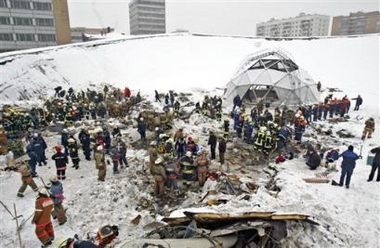|
Roof collapse at Moscow market kills 40
(AP)
Updated: 2006-02-23 18:56
Investigators were looking at three possible causes of
the collapse: improper maintenance of the building, a build up of snow on the
roof and errors in the building's design, Moscow prosecutor Anatoly Zuyev said.
|

Rescuers crowd atop the collapsed roof of a
market as they look for trapped survivors, Moscow, Thursday, Feb. 23,
2006. The concave, snow-covered roof of a three-decade-old Moscow market
collapsed early Thursday, killing and injuring dozens of people, a
spokesman for the Emergency Situations Ministry said.
[AP]
|
Moscow Mayor Yuri Luzhkov, who went to the site to oversee rescue efforts,
said terrorism was unlikely. "Chances are more than 90 percent that a terrorist
act can be ruled out," he told reporters. "It was a technical accident."
Two to three inches of wet snow had fallen overnight, on top of 18.5 inches
that had fallen since the start of winter, the Russian Weather Service said.
But Luzhkov said the roof was designed to clear itself of snow.
"The roof was designed to take a large amount of snow cover, and there was a
special gutter pipe that was always left open so the melted snow could run down,
so there was no special need to have the roof cleared of snow," the mayor told
reporters.
Prosecutors have opened an investigation into the incident, RIA-Novosti said.
Russian media said the entire roof, covering an area of about 2,400 square
yards, had fallen onto the market stalls. Most of the victims were believed to
be municipal and market workers from outside Moscow, though Ekho Moskvy radio
said there could also have been wholesale buyers in the building.
The Interfax news agency said the market had been designed in the 1970s by
Nodar Kancheli, the same architect who drafted the plans for Moscow's Transvaal
water park, where the roof collapsed in February 2004, killing 28 people.
Prosecutors have blamed that collapse on design flaws.
Kancheli visited the market early Thursday.
"I think one possibility is a big buildup of snow," he told Ekho Moskvy
radio. "And they set up kiosks on the mezzanine, which was not originally
planned."
He said corrosion also could have played a role.
|